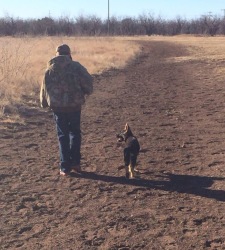Proper socialization is a must for the German shepherd puppy to reach its full potential. A German shepherd puppy that is not properly socialized will not mature into a dog that can be used for a specific purpose for a variety of reasons.
If a dog is not familiar with meeting strangers, it will either turn out to be timid around new people, or unsure of what you expect out of them. This can become an overly aggressive dog. A young German shepherd puppy must be socialized in every environment possible, so they know how to handle any situation. If an individual believes that they have a young dog that is a prospect for police work. Then it needs to get use to the sounds of gunshots. If not, then that dog will most likely not excel in that line of work. The first time the dog hears a gunshot, and it has not adapted to the sound. It will become easily sidetracked from its job. It could also become anxious and tuck its tail and run. That’s not the dog’s error, but rather the owners. And I believe with 100% certainty the breeders.
It is breeders responsibility to make sure that the German shepherd puppy is correctly socialized within its first 10 weeks of life. Too often German shepherd breeders allow a German shepherd puppy to leave their kennel prematurely. Sadly, without proper socialization to make certain that the German shepherd puppy will flourish in everyday life. Proper socialization and assessment of a German Shepherd puppy can not be reached within the first 8 weeks.
A knowledgeable German shepherd breeder is capable of noticing what all of their German shepherd puppies in a litter are suitable for. This could be for show, working, service, protection, search and rescue, companion dog, etc. The only way a breeder who takes true satisfaction in their litter can warranty this, is by making sure a German shepherd puppy is socialized appropriately for the first 10 weeks of their life.
Proper socialization for a German shepherd puppy includes:
- Riding in a vehicle
- Acclimation to being on a leash
- Crate training
- Going to town and meeting strangers while ignoring buses, cars and bicycles. (college campuses are great for this exercise)
- Playing with other dogs large and small breeds (must show no dog aggression)
- Going into a store (this could be as simple as Pet-Smart)
- Walking on slippery floors with out a problem
- Climbing stairs (up and down)
- Indifferent to cats, ducks, chickens, squirrels, grasshoppers, livestock and any other type of animal
- Reacting Indifferently to Gun fire not easily startled and shying away
- Comfortable with children (as seen in our video above)
- Confident at the vet. Allows handler and vet to look in mouth , ears and give a physical exam
- Loud noises like clatter sticks or a bottle with rocks inside should not alarm the puppy or distract it from focusing
- Opening an umbrella does not alarm the dog
- Walking over a bridge with water flowing under it
All of these steps will assist a German shepherd puppy in becoming positive and social. It is the breeder’s responsibility to do this. The Breeder is also accountable to properly socialize the German shepherd puppy with human contact. This can be done from the time of birth. The puppies need to be taught how to trust the human hand. Simply touching the puppy’s paws will help the German shepherd puppy grow accustomed to human touch. This will also allow for easier nail trimming during grooming.
A German shepherd breeder, who truthfully cares about the breed, will ensure what their German shepherd puppy is capable of. They will also scrutinize what type of home the German shepherd puppy will be departing to. If I as a breeder recognize that a German shepherd puppy has a predisposition to bite, that it is sound in temperament, and is non stop with wanting to investigate and do something new. Then I should recognize that it probably won’t make a great companion dog for a couch potato. It also would not make a suitable companion for someone who has never worked with a German shepherd. The German shepherd puppy might be better suited for someone who participates in dog sports. On the other hand if I have a German shepherd puppy that is more laid back and shows no curiosity in exploring or has no prey drive. Then that German shepherd puppy might be better off as a companion dog. A breeder who works with their litter accurately will understand what each dog is capable of. The breeder will also price them accordingly.
The breeder will also take note of a German shepherd puppy that can be used for breeding at a future time. They will also establish which ones almost certainly should not. They can set a limited registration on the German shepherd puppy. This not only ensures that the most excellent German shepherd puppy is able to carry on the bloodline, but it also ensures that a German shepherd puppy will not be used in a puppy mill. This also makes sure a German shepherd puppy will be bred only when it reaches a mature age. The breeder will also more than likely want to see health records on the mature German shepherd. The breeder can always modify a limited registration to full registration .When the owner has shown the breeder the appropriate health certificates, and the bare minimum amount of time has passed so the dog can be bred. Then will the breeder modify the registration.
 The breeder should also have begun the basics of dog obedience training. Even before the German shepherd puppy is allowed to go home with their new owners. This is the only way a breeder can educate the new owner on what works best with the German shepherd puppy they will be adopting. This will give both the new owner as well as the puppy a strong foundation to build on. The basics I’m speaking of isn’t necessarily sit, down, come, stay, etc., but rather engagement, understanding what the marker is by “charging the marker,” being accustomed to the leash, and properly socializing the puppy. This creates a strong foundation for the new dog owner to stand on.
The breeder should also have begun the basics of dog obedience training. Even before the German shepherd puppy is allowed to go home with their new owners. This is the only way a breeder can educate the new owner on what works best with the German shepherd puppy they will be adopting. This will give both the new owner as well as the puppy a strong foundation to build on. The basics I’m speaking of isn’t necessarily sit, down, come, stay, etc., but rather engagement, understanding what the marker is by “charging the marker,” being accustomed to the leash, and properly socializing the puppy. This creates a strong foundation for the new dog owner to stand on.
The breeder should allow the prospected new owner of the German shepherd puppy to visit the kennel frequently before taking the puppy home. They should also encourage the new owner to bring family members for proper bonding. This will assure that all family members are on the same page on how to work with their new German shepherd puppy. This is also the time that the breeder can make sure that the new owners are educated in how to manage any scenario that might arise, teaching the new owner how to take action in any challenging situation.
